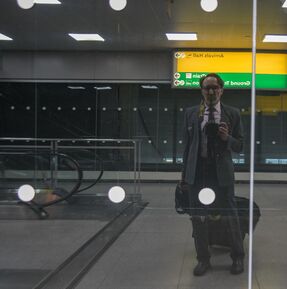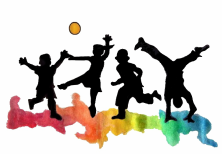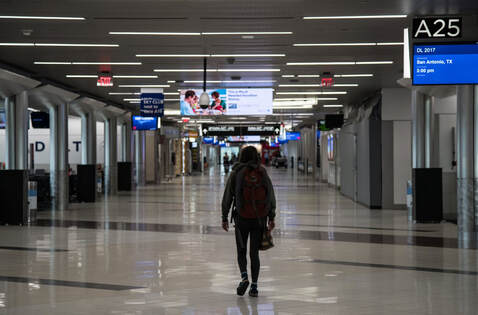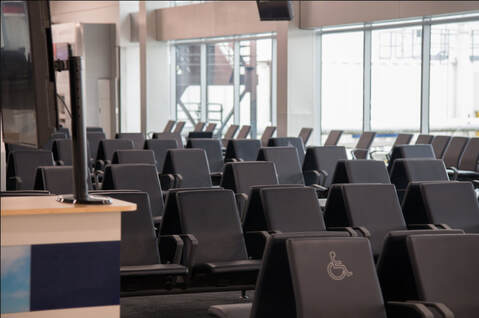 Rouben in an empty airport before his last shift as a flight attendant before getting sick Rouben in an empty airport before his last shift as a flight attendant before getting sick Rouben Madikians is a flight attendant, yoga teacher, photographer, and COVID-19 survivor. His story inspires us to look for connection even in the isolation, and that being vulnerable takes strength and courage. After a few days of feeling foggy and disoriented, Rouben eventually developed a fever and tested positive for COVID-19 while on a layover. Due to that he was forced to self-isolate in a hotel for two weeks. Despite being scared, alone, and feeling terrible, what Rouben shares from this experience is how held he felt by the hotel, his family, and his co-workers. Highlighting his commitment to looking for connection even in separation. Rouben reflects on those two weeks in quarantine, as well as his experience working as a flight attendant during the pandemic, “I miss touching someone on the shoulder, hugs from my friends, shaking my passengers’ hands, or taking a child to the flight deck.” He descirbes a story of infant twins who were hospitalized while ill. Once their nurse put them in the same incubator, one child put their hand on the other, and their vital signs changed almost immediately. This story, he says, shows that we are "social beings." That physical touch physiologically makes him feel better. Rouben’s experience has been that admitting this is vulnerable, and that sometimes people equate vulnerability with weakness. To that he says, “So be it, fuck it.” The feeling of loneliness is so real for so many right now, and even if we’re with other people, we may still feel alone. Rouben explains, “Either we don't have bandwidth [to engage deeply], or there are just so many layers in between us and that person, forcing us to shut down. If I’m shutting myself down to the negative feelings, I’m shutting myself down to the positive...it’s the same neural pathways.” Rouben expressed extreme gratitude for the generosity of family, friends, flight attendants, his company, and the hotel staff. However, his biggest fear is that he could have spread the virus to others before it was detected. Frontline employees don't get tested until they show symptoms. Rouben didn’t have symptoms until about six days into his illness, and even after he had a fever, he had to obtain a prescription in order to be tested. “We need to be tested, no questions asked,” said Rouben, “I hope the rules change around that.” "Maybe I needed to get covid to go deeper into this. So, in a way, I'm grateful." Rouben is trying to find the silver lining in all of this, and he wanted to share some photos to show the human side of this pandemic. His intention had been to share these right before he got sick, but he is finally feeling inspired to still get them out there. He leaves us with the following paraphrased quote from Rumi: “What was said to the rose that made it open, was said to me here in my chest.” Self-care activities: In response to the guilt Rouben expressed around possibly having spread COVID-19 to someone else while asymptomatic, we just want to remind you, that if you’re an essential worker, you are putting your life at risk for the well-being of your community. You are showing up because you’re asked to, because we need your skills, and it does not need to be your burden to bear alone. It is the responsibility of our government and the companies you work for to keep you safe, to make sure that you have full access to tests. Rouben is incredibly connected to his physical body and even he could not detect it for potentially six days. Using mantras: Find a mantra for yourself that highlights self compassion, self-forgiveness, and self-love to use at times when you feel burdened by guilt. It may be as simple as, “I did the best I could with what I knew in that moment," or "It is not my fault." Try to make it something that feels easy to access in the heaviness of guilt and hits a cord with self-compassion for you. Keep a gratitude journal: This can be a daily journal to reflect on at least one human interaction a day that you feel grateful for. For Rouben it could be that a passenger greeted him in a way that made him smile, or that a family member reached out to him. For someone at home who doesn't have daily interaction with people, it may encourage you to reach out to an old friend or someone who makes you smile. By having the dedication to this daily journal, you will intuitively start noting even the smallest positive interactions. It is said that it is not joy that brings gratitude, but gratitude that brings joy. So especially in a time like it, focusing on gratitude can be a very powerful action. Physical distancing does not have to mean emotional distancing: We can’t change the need for physical distance right now. We can’t change the need for masks, or gloves, or Purell, or six feet of separation. But we can change our approaches to emotional connection to better suit this time. Even the term "social distancing" suggests a distance beyond just the physical. Do you feel like you are holding back from deeper conversation? Do you feel as though there are things you want to talk about or laugh about that you are pushing back down so as not to get “too close” to someone even in a non-physical way. See if you can challenge yourself in one social interaction over the next few days to check in about this. If you are finding any hesitation in connecting, just breathe into it and see if you can let some of it go. We have to distance physically. We don't have to distance emotionally. Find a Support Person: As Rouben so clearly let us know, vulnerability is actually strength. It takes strength to let your guard down. And it is a kind of strength that can lead to rejuvenating support. Think about what happens if you put too much air into a balloon without letting any out. It will pop. It is probably safe to say that many of your balloons are pretty full right now. In order to do this exercise, all you need to do is identify one person that you know you can trust and you feel safe with. Then come up with a word between the two of you that you can say, or text to that person, when you are feeling like you need some support. Establish early on that reaching out does not mean you actually need to talk about what’s bothering you, though you can if that feels right. Part of this is just owning the act of letting someone else know that you are not ok. Because, as Rouben said, none of us are ok 24/7. And that is ok. Try to think of it as though any time you are using this activity, you are letting a little bit of air out of your overfilled balloon. This is not meant to deflate you and unpack everything inside your balloon that is making it so full. But rather to provide you with a way to begin receiving support. A way to just make sure your balloon doesn’t pop. The path we walk will not always be easy, but if we can look for connection, even in the separation, we at least won’t have to walk it alone. See more of Rouben’s photos here, and listen to the full episode here. Please don’t forget to subscribe and give us a rating wherever you listen to your podcasts. Lastly, please email us at info@playingtolive.org if you know of someone who you’d like to hear on our show, or topics you’d like for us to discuss. Until then, stay safe and emotionally close!
0 Comments
Leave a Reply. |
AboutIn Season 1 of Finding the Helpers, we are bringing personal stories of front line staff and families impacted by COVID-19. Our diverse guests will be invited to share their story of being on the front line, and in combination to their story, two expressive art therapists will provide art and creative activities that will support the challenges the individual and their family is facing. These could include ideas for short relaxation techniques to be done on the front line, creative ways to explain in kid friendly terms what is happening, ways to stay connected to family and children during long periods of isolation, etc. Throughout the podcast, conversation will include mental health insight related to the pandemic, anxiety and stress, grief and loss, resiliency, coping skills, and understanding the pandemic. Presented by the nonprofit Playing to Live's, whose history began in 2014 as a grassroots program focused on bringing play and creativity in the midst of the Ebola deadly viruses. Following our work in Ebola, we have continued our work as advocates and creators for play and expression across the globe in refugee settings, post war countries, and in the United States of America.
AuthorLindsay Bingaman is the Regional Program Manager for Playing to Live, based in Nairobi, Kenya. Archives |



 RSS Feed
RSS Feed